Dark Souls 3 trades the series' mystique for accessibility
I said in my recent hands-on that Dark Souls 3’s immediacy of combat, alongside the variety and malleability in its tones and systems, makes it feel like a rapid-fire love letter to the whole series. It’s every bit the curated megamix of all of From Software’s RPG work thus far, and tips its cap in no small way to the aggressive excesses of Bloodborne along the way. But the key part of that description is the phrase “rapid-fire”.
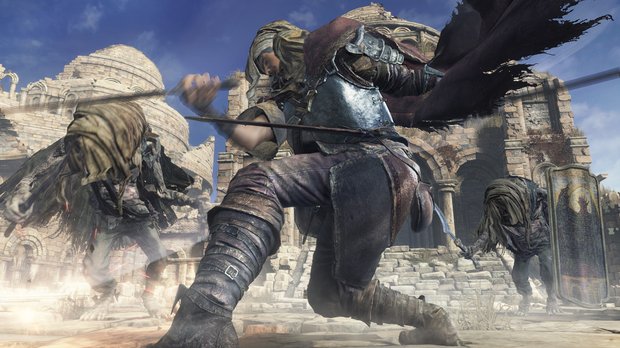
Because, while this is clearly a Dark Souls that wants to give you a concentrated dose of every trick the series has learned over the years, that’s not all it is. It’s also a Dark Souls that wants to give you everything straight away, all at the same time, like an excitable dog with a winsome, but slightly try-hard attitude.
And that’s fun, but it perturbs me slightly. Because front-loading the fun has never been the point of this series.
Think about your first run through Dark Souls. Think about the high points. Think about those powerful, resonant moments that changed your view of the game you were exploring, and that still linger in your mind as permanent stand-outs of the whole experience - and let’s face it, your entire damn life now. Did any of them come from clarity, empowerment, or in any way feeling like you were at all on top of anything? No. No, they did not.
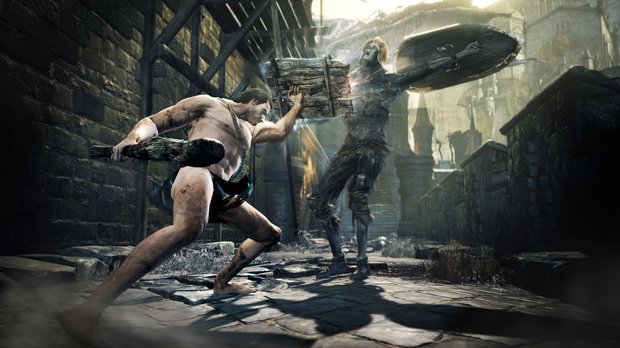
Rather, they were moments like the first time you reached the Firelink Shrine, and had no idea what was going on, or what any of it meant, but good Lord you felt safe for the first time in forever so you were just going to accept it. Or the moment you realised that you didn’t have to fight the Undead Burg’s more terrifying enemies, like Havel and the black knights, and could instead cut a path past them, surviving so that you could come back to investigate when you were stronger. Or when you got a rare weapon drop that transformed your play-style and - having later found out how weapon and magic levelling actually worked - started mapping out a long-term class progression for yourself. You had no idea if you were doing the right thing, but it felt like it was probably right, so you just went with it to see what would happen.
In short, the great Dark Souls moments all come from a close relationship with the unknown. They come from, if not actually overcoming uncertainty, then at least feeling your way through the shadows until you eventually discover a path that seems navigable with relative safety. This obtuseness, this demand on your own self-reliance and ingenuity, is the fuel that powers Dark Souls’ entire ethos of danger, learning, and personal growth. It makes every successful step forward an important milestone in progress. It elevates every new piece of vague understanding to the state of weaponised revelation. It ensures that each hard-won victory and profit delivers an invigorating change in both your capability and world-view, your confidence and insight – into both your foes and yourself – ebbing and flowing throughout the game, as problems lead to solutions and vice versa.
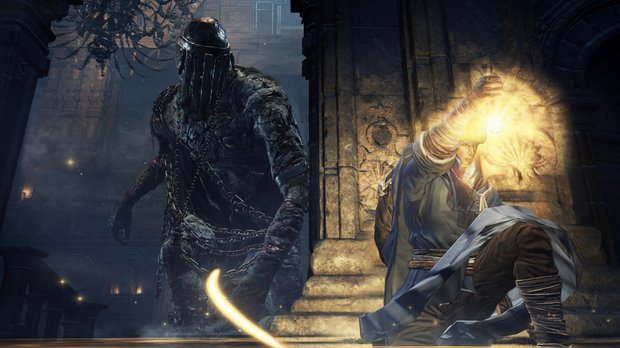
It’s a whole other level of role-playing to that seen in most RPGs. Rather than simply manipulating a game’s systems after enjoying an hours’ Character Growth 101 tutelage, in Dark Souls’ arcane world, you are as important a tool as any menu. You build, experience, and understand Lordran through what you bring to it, your own intrigue and willingness to explore reaping the greatest rewards, both tangible and personal.
Weekly digests, tales from the communities you love, and more
And I kind of worry that Dark Souls 3 won’t have so much of that.
Because Dark Souls 3, in-keeping with its Greatest Hits Package presentation, seems to be fast-tracking the player to everything the series used to make them decipher and discover. The familiar tropes are there, but the slow journey of understanding they used to demand currently seems lacking. Starting classes feel more robust from the off, and more likely to guide player progress long-term than in games past, but more than that, DS3 removes a great deal of world-building and systemic mystery from its opening hour.
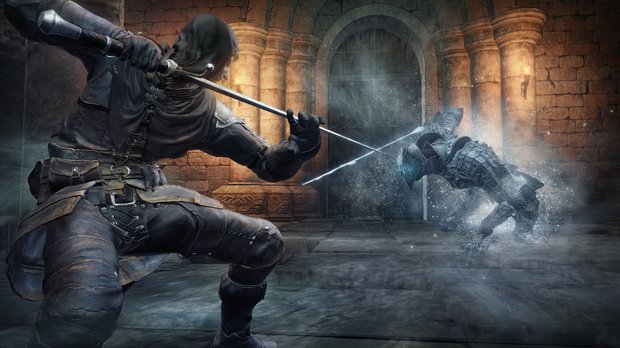
Reach the Firelink Shrine, for instance – a short hop, skip and dismember from the start, just after the training boss – and you’ll find not only the traditional Firekeeper, but also Andre the Blacksmith (and therefore the entire gear levelling path), and the game’s first (handsomely stocked) merchant. It’s basically a fantasy medieval version of Bloodborne’s Hunter’s Dream utility area. And here’s where we hit the ‘interesting’ truth that Dark Souls 3 is reminiscent of Bloodborne in ways far beyond the pace of its combat.
Because in the more streamlined, action-driven Bloodborne – a game which is more spin-off and spiritual successor than sequel, not to mention one intended to pull in a new audience as a top-line PS4 exclusive – a clearer approach made sense in itself, and within the context of the less RPG-driven game as a whole. But in Souls? In a role-playing game that uses the stark demands of oblique problem solving in order to bond player and character development more closely than any others of its ilk? It doesn’t feel entirely comfortable.
In Dark Souls, finding any help along your journey is a journey itself, powers, upgrades, clues and systems hidden away many hours into the game, and easy to miss entirely. And with very good, deliberately calculated reason. The presentation of the first five hours of Dark Souls 3 though, seems to keep the systems but lose their original purpose. It’s a situation exacerbated by the way that significant weapons seem to come more from prescribed chest discovery than rare drops. Again, a very Bloodborne bit of streamlining.
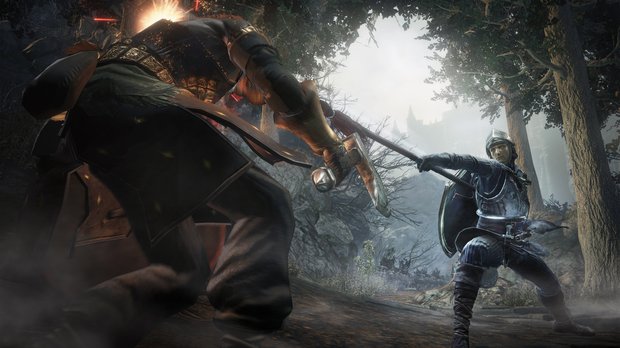
Perhaps though, by the time of a part three, the loss of some mystery was inevitable. Perhaps, in fact, Dark Souls could never truly exist more than once in its purest form, sequels inevitable but fundamentally unable to recreate the experience. By their very nature, intrigue and discovery cannot be repeated using the same systems – probably another reason Bloodborne took a slightly different direction. With repetition comes inherent degradation of the unknown, and many Dark Souls players have walked this path before.
Maybe then, Dark Souls 3’s structure is less an erroneous mis-step as it is an admission of the problem, expressed through the very game design at the heart of the issue. Miyazaki is, after all, nothing if not a very insightful, experiential designer, one who has long mastered the art of communicating meaning through interaction. Coming alongside the end of Dark Souls as we know it, before From retools the series’ values in a fresh new direction, it’s entirely possible that DS3’s more direct, accessible set-up is intended as an everything-must-go fire sale, burning all that’s left as fast and as bright as possible, in the knowledge that the old shadows of mystery and intrigue just can’t and won’t do the job any more.
In order to deliver the same magic, Dark Souls can no longer use the same methods. A new set-up is required in order to evoke the old sense of inscrutability. That is coming, eventually. And it may be no coincidence that the reconfiguration has been announced alongside a Dark Souls that looks to finally throw light upon the remaining cracks, burning the last of the old flame up to purge the past and make way for a new ignition at some other place and time. A strange transition for old hands, to be sure, but a necessary process in keeping the series alive.
Want to master Lothric like no Unkindled before you? Check out our Dark Souls 3 tips!



